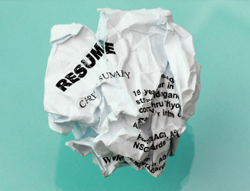Jobseekers: How to Handle Rejection
23 August 2010

According to the 2010 study conducted by the U.S. Department of Labor, there will be, at the very least, 5 to 6 people fighting for one vacant position. This means more than 80% of the applicants will be rejected — and you can be one of them.
Admit it, any kind of rejection is bad, especially if it is something you really want for such a long time. Coping will not take overnight either. However, before you start wallowing in self-pity, learn how to deal with it more effectively using the following tips:
• Grieve and get over it.
Many of the so-called experts will tell you to move on. The problem is, since you did not deal with the emotion, it crops up a lot of times. In fact, a lot of people develop a fear of looking for jobs because of their past rejections.
When you are rejected and not that emotionally strong, grieve over it. If you feel like crying, then cry. Don’t bury your sentiments. Even if you’re a macho man or a guy with too many tattoos, letting your emotions out is not a sissy thing.
However, put a limit on when you will allow the pain to hit you. After grieving, pick up the pieces, move on, and look for another job.
• Know it is not your entire fault.
There are many reasons why you are rejected, so stop blaming everything to yourself. For one, there is definitely someone better than you. Your qualifications may have not matched to the needs of the company. Or the firm may be “reserving” you for a much better position.
• Be ready for it.
Of course, it is important to face every challenge with a positive outlook. Nevertheless, do not shut off your mind to negative possibilities, including rejection. It may hurt, but the set expectation will somehow soften the blow.
• Talk to someone.
If it is necessary for you to give off emotional loads, share the experience with someone. Grab a few beers or go out with friends. Spend time with your boyfriend/girlfriend or husband/wife. Have the warmth of your family over dinner. Allow positive energies to take over the negative ones. Before the day ends, there is a huge chance you will forget the feeling of rejection.
• Assess yourself.
Use the rejection as a chance to evaluate yourself as a potential candidate. Perhaps you definitely need more education or training, or you lack considerable experience. You may even need to improve how you “sell” yourself to employers. Use the experience of rejection as a learning tool. In time, this will increase your self-value.
• Send a Thank You note.
Saying “Thank You!” to someone is an easy thing. But how about saying it to the one who rejected you? It may be the last thing on your mind, but it actually helps. It shows your integrity, level-headedness, and sportsmanship. It also allows you to inform the “rejecter” that you are just around should an opportunity that matches your skill will be available.
• Put everything behind you.
As much as possible, push all the bad memories off your mind, especially when you are going to have another interview. How you feel and see your rejection experience can have a positive or negative impact to your forthcoming interviews.




